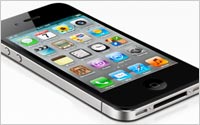iOS, Android Grab Share From Troubled RIM
- by Mark Walsh @markfwal, April 23, 2012
 Android and Apple’s iOS
platform both gained share of the North American smartphone market at the expense of BlackBerry, according to the latest data from mobile ad network InMobi. iOS maintained its narrow lead over Android
in the first quarter, with as 36.8% share, up from 33.1% in the fourth quarter of 2011. Android came in at 34.1%, up from 32.5% in the prior quarter.
Android and Apple’s iOS
platform both gained share of the North American smartphone market at the expense of BlackBerry, according to the latest data from mobile ad network InMobi. iOS maintained its narrow lead over Android
in the first quarter, with as 36.8% share, up from 33.1% in the fourth quarter of 2011. Android came in at 34.1%, up from 32.5% in the prior quarter.
By contrast, Research in Motion’s BlackBerry OS dropped from a nearly 12% share in the fourth quarter to 7.3% in the first three months of 2012. The quarterly drop-off signals the troubled handset maker’s continuing decline as a result of Apple and Google’s growing dominance of smartphone operating systems.
RIM last month reported sales plummeted 25% in the fourth quarter.
Globally, Android was the top smartphone platform in Q1, however, with 22.2% of impressions compared to 18.2% for iOS.
The iPhone, iPad and iPod alone accounted for 37% of impressions on InMobi’s network in North America, with the BlackBerry 8520 a distant third among individual devices, generating almost 2% of impressions. Among phone manufacturers, Nokia was second behind Apple, with 14% share of impressions, followed by Samsung and HTC (both 9%), RIM (7%), LG (6%) and Motorola (5%).
"Apple maintained its lead over Android and further increased its share of impressions and handset dominance; the new iPad certainly helped its overall position,” said Ann Frisbie, vice president and managing director, North America, at InMobi “However, we know that fierce competition is created across the operating systems when new devices enter the market and this time last year Android surpassed iOS globally.”
Apple should provide figures for iPad and iPhone sales in the quarter when it reports its latest financial results April 24. But sales of the Apple tablet won’t reflect the full impact of the new iPad model, which was only launched last month. Frisbie suggested Apple could see heightened challenges in the U.S. market later this year with a rumored launch of an Android-based smartphone from Amazon and a 7-inch Google-branded tablet.
Microsoft is also expected to introduce a much-anticipated Windows 8 during the latter half of 2012.
InMobi’s North American network grew impressions 18% in the first quarter to 52.6 million, the vast majority of which (84%) came from smartphones.



Size matters and RIM's often talked of historic "dominance" was in the era when smartphones were rare; RIM never were big.
Today there are three behemoths who, having immense resources, make any RIM contribution insignificant.
The departing Jim Balsillie may yet be venerated as his negotiations with the leading global network providers offered a continued and valid presence for RIM services, offering superior and more efficient messaging, data and social network transmission.
The BlackBerry device per se, being emotive but of transitory importance. A keyboard is a keyboard is a keyboard.
You hit the nail on the head, John, regarding RIM's dominance pre-smartphone. I had 5 different BlackBerry devices in ten years, sticking with it while my coworkers and friends turned to iPhones and Windows & Android devices, because work email and long battery life are my #1 and #2 priorities, and I always felt nothing else did the job as well as BlackBerry. But by last year I started feeling like I was in a box, missing out on a good browser and the productivity apps that RIM devices are struggling to keep up with, not to mention amazing things I could see others doing on their smartphones which were not part of my RIM world; I went to an Android smartphone and couldn't be happier. Yes, the pitiful battery life did make me pine briefly for my BlackBerrys, but I guess you can't have everything.
Should have bought a 9900 then.
Blackberry: the new "brick" cellphone...